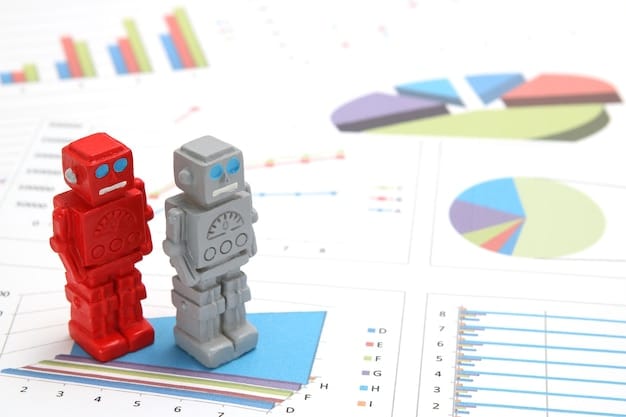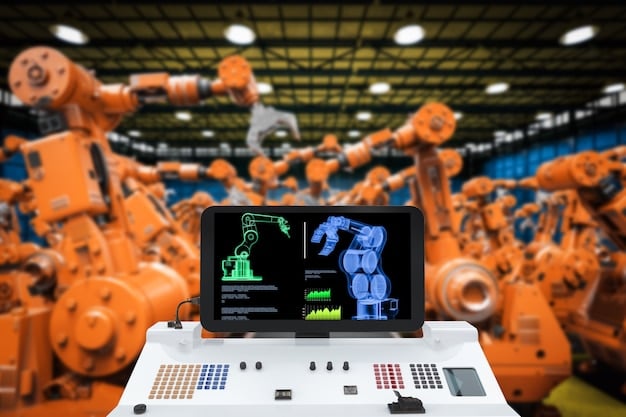AI and Jobs: Navigating the Future of Work in the US

The impact of AI on employment in the US is reshaping industries, necessitating proactive preparation for new roles, skill development, and adaptation to an evolving job market influenced by automation and artificial intelligence.
Artificial intelligence is no longer a futuristic concept; it’s actively transforming the employment landscape. Understanding the impact of AI on employment in the US is crucial for workers, businesses, and policymakers to prepare for the future of work.
Understanding AI’s Current Impact on Employment
The integration of artificial intelligence into various sectors is already affecting employment trends. Automation driven by AI has increased efficiency and productivity but also raised concerns about potential job displacement. This section explores the current state of AI’s influence on the US job market.
Automation and Job Displacement
Automation, a key component of AI, is rapidly changing job roles across industries. It’s essential to understand the extent of this change and its potential impact on the workforce.
- Increased Efficiency: AI-driven automation enhances productivity by performing repetitive tasks faster and more accurately.
- Job Role Transformations: Automation leads to some jobs becoming obsolete while creating demand for new roles that require AI management and oversight.
- Economic Impact: The economic benefits of automation, such as reduced costs and increased output, must be balanced against the potential social costs of job losses.
AI-Driven Job Creation
While some jobs are being automated, AI is also fostering new employment opportunities. This section examines the emerging roles and skills in demand due to AI.
- AI Specialists: Demand for data scientists, machine learning engineers, and AI developers is growing exponentially.
- AI Integration Roles: Professionals who can integrate AI solutions into existing business processes are highly sought after.
- Ethical Considerations: AI ethicists and governance experts are needed to ensure AI is developed and used responsibly and ethically.

In conclusion, AI’s current impact on employment is a mixed bag, with job displacement in some areas balanced by job creation in others. Understanding these dynamics is crucial for developing strategies to navigate the future of work.
Industries Most Affected by AI
AI’s influence varies across different industries. Certain sectors are experiencing more profound transformations due to AI adoption. This section identifies the industries most affected and the specific changes occurring within them.
Manufacturing
AI and automation are revolutionizing manufacturing processes. From robotic assembly lines to AI-powered quality control, the sector is becoming more efficient and data-driven.
Healthcare
AI is transforming healthcare through applications such as diagnostic tools, personalized medicine, and automated administrative tasks. It enhances patient care and operational efficiency.
Finance
The finance industry is leveraging AI for fraud detection, algorithmic trading, and personalized financial advice. These applications improve accuracy and customer experience.

In conclusion, industries like manufacturing, healthcare, and finance are at the forefront of AI adoption, experiencing significant changes in their operational and employment models.
The Skills Needed for the Future Workplace
As AI reshapes the job market, there is a growing need for new skills and competencies. Preparing for the future requires understanding which skills will be most valued and how to acquire them. This section outlines the key skills needed for the AI-driven workplace.
Technical Skills
Technical proficiency is becoming increasingly important in many roles. Individuals need to develop skills in areas such as data analysis, machine learning, and AI programming.
Soft Skills
While technical skills are crucial, soft skills such as critical thinking, creativity, and emotional intelligence are equally important. These skills enable individuals to adapt to new technologies and collaborate effectively.
Adaptability and Lifelong Learning
The ability to adapt to new technologies and embrace lifelong learning is essential for staying relevant in the rapidly evolving job market. Continuous education and training are vital for career success.
Education and Training Initiatives
To prepare the workforce for the changes brought about by AI, effective education and training initiatives are necessary. This section explores potential strategies and programs to equip individuals with the skills needed for the future.
Government Programs
Government-funded programs can play a crucial role in retraining workers and providing access to education and resources. These initiatives can support individuals in acquiring new skills and transitioning to new roles.
Corporate Training
Companies should invest in training programs for their employees to help them adapt to AI-driven changes. This includes providing opportunities for upskilling and reskilling to meet the evolving demands of the workplace.
Online Learning Platforms
Online learning platforms offer flexible and accessible options for acquiring new skills and knowledge. These platforms provide a wide range of courses and resources to support lifelong learning.
Addressing Ethical Concerns and Bias in AI
As AI becomes more prevalent, it’s essential to address ethical concerns and potential biases. Ensuring fairness, transparency, and accountability in AI systems is crucial for building trust and promoting equitable outcomes. This section examines the ethical considerations and biases in AI and strategies to mitigate them.
AI solutions can sometimes perpetuate and even amplify existing biases if the data they’re trained on reflects societal inequalities. Recognizing this challenge is the first step toward creating more equitable AI systems.
- Data Diversity: Ensuring training data is diverse and representative of all populations can help reduce bias in AI algorithms.
- Algorithmic Transparency: Understanding how AI algorithms make decisions allows for the identification and correction of biased outcomes.
- Ethical Frameworks: Developing and implementing ethical guidelines for AI development and use can ensure AI systems are fair, transparent, and accountable.
The Role of AI Ethics in Employment
With AI increasingly influencing hiring and workplace decisions, ethical considerations become even more critical. Fairness, transparency, and accountability must be central to leveraging AI in employment practices.
- Bias-Free Hiring: Ensuring AI-driven hiring processes are free from bias is essential to promoting equal opportunity and preventing discrimination.
- Transparent Decision-Making: AI systems that make hiring or promotion decisions should be transparent, allowing individuals to understand the factors influencing those decisions.
- Accountability: Organizations must be accountable for the outcomes of AI-driven employment decisions, ensuring they align with ethical standards and legal requirements.
Ultimately, tackling ethical concerns and biases in AI is not just a technical challenge but also a moral imperative. By focusing on data diversity, algorithmic transparency, and ethical frameworks, we can ensure AI benefits all members of society equally.
Policy Recommendations for a Fair AI Transition
To effectively manage the impact of AI on employment, proactive policy measures are needed. These policies should focus on supporting workers, promoting education and training, and ensuring a fair and equitable transition. This section outlines some policy recommendations to guide the AI transition.
Investment in Education and Training
Increased investment in education and training programs is essential for equipping workers with the skills needed for the AI-driven economy. This includes funding for vocational training, apprenticeships, and online learning resources.
Safety Nets and Income Support
Strengthening social safety nets and providing income support for workers displaced by AI can help mitigate the negative impacts of automation. This may include unemployment benefits, universal basic income, or other forms of assistance.
Regulation and Oversight
Establishing regulations and oversight mechanisms can ensure that AI is used responsibly and ethically in the workplace. This includes protecting workers’ rights, preventing discrimination, and promoting transparency in AI decision-making.
| Key Concept | Brief Description |
|---|---|
| 🤖 Automation Impact | AI-driven automation increases efficiency and transforms job roles. |
| 💼 Emerging Skills | Technical and soft skills are vital for future job opportunities in AI fields. |
| ⚖️ Ethical Concerns | Addressing bias in algorithms is essential for equitable AI deployment. |
| 📚 Education Initiatives | Government, corporate, and online platforms must offer training for new skills. |
Frequently Asked Questions
▼
AI is increasing automation, leading to job displacement in some sectors while simultaneously creating new roles in AI development, integration, and ethics. This shift requires workers to adapt to new skill sets.
▼
Industries like manufacturing, healthcare, and finance are experiencing significant AI-driven transformations. These sectors are adopting AI for automation, diagnostics, and financial analysis, impacting job roles and skill demands.
▼
Future jobs will require a blend of technical expertise, such as data analysis and machine learning, along with essential soft skills like critical thinking, creativity, and adaptability. Continuous learning is also critical.
▼
Ethical concerns include biases in AI algorithms leading to unfair hiring practices, transparency in AI decision-making processes, and accountability for the impacts of AI on workers’ rights and job security.
▼
Policy recommendations focus on investing in education and training, strengthening social safety nets for displaced workers, and creating regulations to ensure the responsible and ethical use of AI in the workplace.
Conclusion
The impact of AI on employment in the US represents both a challenge and an opportunity. By understanding the changing landscape, investing in education and training, addressing ethical concerns, and implementing proactive policies, we can navigate the AI transition and create a future of work that is fair, equitable, and prosperous for all.





